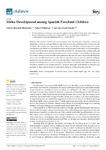Motor Development among Spanish Preschool Children

Use this link to cite
http://hdl.handle.net/2183/27632Collections
- Investigación (FEDU) [938]
Metadata
Show full item recordTitle
Motor Development among Spanish Preschool ChildrenDate
2021Citation
Honrubia-Montesinos, C.; Gil-Madrona, P.; Losada-Puente, L. Motor Development among Spanish Preschool Children. Children 2021, 8, 41. https://doi.org/10.3390/children8010041
Abstract
[Abstract] The purpose of this study was to analyze motor development of Spanish preschoolers, taking into account sex and age, being an only child, prematurity, and the practice of extracurricular activities. The sample was composed of 300 preschoolers (132 girls, 168 boys) ages 3 to 6 years. Preschoolers were tested on 12 fundamental motor skills (locomotor and object control) through the Test of Gross Motor Development—Second Edition (TGMD-2). Nonparametric analysis indicated that there are differences between girls and boys in locomotor and object control skills in the age range of 3–4 years. However, boys and girls scored similarly at the age of 5 years in locomotor development. There were not differences between only children and those who are not only children. Similarly, prematurity was not associated with locomotor and object control development. Nevertheless, those preschoolers who practice extracurricular physical activities scored significantly higher in comparison with those children do not. Further research is needed to shed light on the differences between boys and girls in object control. It may be explained by the types of extracurricular activities.
Keywords
Motor development
Locomotor skills
Object control skills
Age
Sex
Only child
Prematurity
Locomotor skills
Object control skills
Age
Sex
Only child
Prematurity
Editor version
Rights
Atribución 4.0 (CC BY 4.0)






